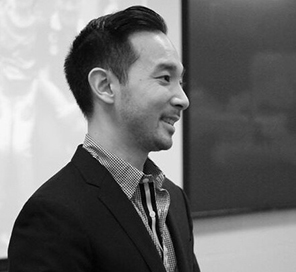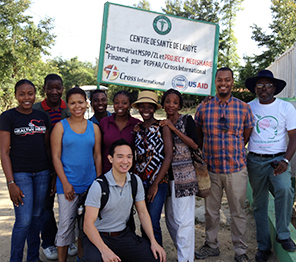MPH, MSN, CRNP, RN, PMHNP-BC
It is commonplace that for many people, their lives are shaped and greatly influenced by their family and early years. While this was certainly true for Shinichi Daimyo, he has also shown a remarkable commitment to learn from every experience, refining his understanding and adjusting his career path along the way.
The son of a Vietnamese mother and Japanese father, Shinichi grew up in Los Angeles among the community of “boat people” refugees, people who suffered a loss of home, prejudice in their new country, and for many, the traumas of war as well. Yet despite the mental toll these changes exacted, many in his community remained silent about their condition, out of cultural habit and a fear of standing out here in the US. And tellingly for Shinichi, there was little to no help available even if anyone in his community had sought it out. This inequity, this imbalance between need and help, was something Shinichi would see play out in country after country, as he traveled the world working with colleagues to collaborate and build mental health services with local communities.
Shinichi was encouraged to study business in college, which was understood to be the most accessible path to the American Dream for him and his family. In his sophomore year, however, on a service trip to a Navajo reservation, Shinichi was inspired by Navajo culture and practices emphasizing our common humanity and common care for one another. Learning from the Navajo people, how they lived their lives and cared for each other, he says, was “transformative,” because it connected the lives of his immigrant and refugee community to the Navajo people in that both faced common mental health challenges. He subsequently changed his major to psychology, graduating with honors from the University of Southern California.
There followed a fellowship from Duke University (Human Rights and Humanitarian Affairs Policy), and degrees from Boston University (MPH, Global Health), and Yale University (MSN, Psychiatric-Mental Health Nurse Practitioner specialty), as well as work at WHO, Harvard Medical School, the VA, Partners in Health, and most recently, as the Senior Clinical Lead, Mental Health / Co-Chair, Equity in Community Mental Health at Project HOME in Philadelphia, which seeks “to eliminate chronic homelessness through sustainable housing, education, medical care, and employment.” He was also the first nursing student to receive the Paul & Daisy Soros Fellowship for New Americans, and currently serves on the Boards of the Southeast Pennsylvania Area Health Education Center, the American Psychological Association, and Generation Mental Health. Recently, Shinichi moderated Unite for Sight’s keynote with Vanessa Kerry (https://ghic.uniteforsight.org/schedule) and was a speaker on Equity in Global Health. He’s also spoken before the National Association of Social Workers on equity, antiracism, and mental health. Shinichi has also published in academic journals on the implementation of integrated and task-shared mental health systems in low resource settings globally, and spoken domestically and globally as an expert on global mental health.
Like many MFP/ANA Fellowship recipients, Shinichi learned of the program from another program participant, in this case Tamanna Rahman (MSN, RN). He credits the Fellowship with enabling him to “understand mental health from an equity lens, find racial equity at Yale, find my voice in equity and mental health in speaking at conferences and lectures, and better understand our role in integrating collective liberation in our work.” He adds one other key benefit: “self-care/sleep (seriously, the fiscal support is huge!).”
In addition to Rahman, Shinichi names at least eight others who have helped him both professionally and personally along the way. He saves special thanks, though, two groups: a group of 15 veterans living with schizophrenia who, he says, “taught me more about compassionate, equity-driven mental health care than anything in my training,” and his colleagues and communities served locally and globally which welcomed and inspired him to push for equitable mental health care for all.
On his work in more than a dozen countries around the world (including Haiti, Rwanda, Peru, Lesotho, Malawi, Switzerland, Mexico, Sierra Leone, Liberia, Russia, Pakistan, and India) Shinichi says he came to realize that “nurses hold the game-changing power to address the significant equity gaps in mental health globally.” But beyond nursing’s traditional role, he says, “we have an ethical responsibility to not only do research, treat patients, but to be advocates for our communities,” and to speak up for and with those too often oppressed and forgotten.
Mr. Daimyo is available for talks or panel discussions. For information, please contact him here: sdaimyo@solidaritymh.com


